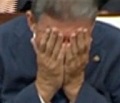You are not logged in. Please register or login.
- Topics: Active | Unanswered

- Communist China
- Rep: 130
Re: Wall Street and Banks Soaring since 2009
I found this article from the Washington Post very interesting:
President Obama has called people who work on Wall Street “fat-cat bankers,” and his reelection campaign has sought to harness public frustration with Wall Street. Financial executives retort that the president’s pursuit of financial regulations is punitive and that new rules may be “holding us back.”
But both sides face an inconvenient fact: During Obama’s tenure, Wall Street has roared back, even as the broader economy has struggled.
The largest banks are larger than they were when Obama took office and are nearing the level of profits they were making before the depths of the financial crisis in 2008, according to government data.
Wall Street firms — independent companies and the securities-trading arms of banks — are doing even better. They earned more in the first 21 / 2 years of the Obama administration than they did during the eight years of the George W. Bush administration, industry data show.
(See data in an Excel file here.)
Behind this turnaround, in significant measure, are government policies that helped the financial sector avert collapse and then gave financial firms huge benefits on the path to recovery. For example, the federal government invested hundreds of billions of taxpayer dollars in banks — low-cost money that the firms used for high-yielding investments on which they made big profits.
Stabilizing the financial system was considered necessary to prevent an even deeper economic recession. But some critics say the Bush administration, which first moved to bail out Wall Street, and the Obama administration, which ultimately stabilized it, took a far less aggressive approach to helping the American people.
“There’s a very popular conception out there that the bailout was done with a tremendous amount of firepower and focus on saving the largest Wall Street institutions but with very little regard for Main Street,” said Neil Barofsky, the former federal watchdog for the Troubled Assets Relief Program, or TARP, the $700 billion fund used to bail out banks. “That’s actually a very accurate description of what happened.”
Neither the Bush administration nor the Obama administration, for instance, compelled banks to increase lending to consumers, known as “prime borrowers.” Such a step might have spurred spending and growth, although generating demand for loans may have proved difficult in the downturn.
A recent study by two professors at the University of Michigan found that banks did not significantly increase lending after being bailed out. Rather, they used taxpayer money, in part, to invest in risky securities that profited from short-term price movements. The study found that bailed-out banks increased their investment returns by nearly 10 percent as a result.
“If the goal was to support lending, it would have been sensible to require a portion of the money to support credit origination,” said Ran Duchin, one of the finance professors who completed the study. “Lending to prime consumers was not the most profitable use of their capital.”
Some of Wall Street’s success has moderated in recent months, with bank stock prices down and layoffs on the rise. This mostly has reflected the renewed slowdown in the U.S. economy this year and the European debt crisis buffeting global markets.
Representatives of the financial industry say regulations in last year’s Dodd-Frank legislation, which Obama pushed for and signed, also have crimped bank profits. But many analysts think the law will make the financial system more stable. The legislation, for instance, requires banks to maintain a greater capital cushion to withstand losses during bad economic times. The measure also created a regulator whose sole purpose is to police lending to ordinary Americans.
But many of the legislation’s most significant measures have yet to be put into place, and their ultimate effect on the bottom line remains unclear.
Financial firms have raised major concerns about one of the largest structural changes made by the law, the “Volcker Rule.” This measure would bar banks from engaging in trading and other speculative activity on their own behalf rather than to profit customers. But the rule’s impact could prove limited because of loopholes and exceptions allowed by lawmakers and regulators working to implement it.
Federal assistance
One of the main reasons Wall Street rebounded so quickly from its lows is government support.
Even before Obama took office, the government pumped hundreds of billions of dollars into banks. The Federal Reserve, which is independent of the administration, lowered interest rates, allowing firms to borrow money cheaply and trade with it, booking huge profits. The Fed also introduced lending programs that bolstered stock and bond markets and allowed banks to earn a steady return on reserves they kept with the central bank.
“The too-big-to-fail banks got bigger profits and avoided failure because of trillions of dollars of loans directly from the Federal Reserve,” said Linus Wilson, assistant professor of finance at University of Louisiana at Lafayette. “Today, their profits are boosted by lower borrowing costs because their managers and creditors expect a Fed lifeline when markets get jittery.”
Banks also have benefited from the large increase during the recession in unemployment insurance. Increasingly, banks offer debit cards to the unemployed to collect their government benefits. These debit cards carry a range of fees that bolster banks’ bottom lines.
What’s more, states — with their budgets shattered by the financial crisis and recession — have increasingly been moving to enroll new employees into Wall Street-run retirement accounts rather than government pension programs. That’s potentially more lucrative for Wall Street, which can charge fees for managing the savings of individual retirees.
Since Dec. 31, 2008, the largest banks — those with more than $100 billion in assets — have increased their total combined assets by about 10 percent.
As banks get larger, they can become more profitable. This is because investors tend to be more willing to lend them money at interest rates lower than those other banks are charged. There is a common perception that big banks are less risky because the government will still step in to save them if they get into financial trouble. On the flip side, under new financial regulations, the largest banks will have to hold more financial reserves than smaller banks — although precisely how much is still being discussed.
Banks’ profits up
Profits have also rebounded. The largest banks, including Bank of America, Citigroup and Wells Fargo, earned $34 billion in profit in the first half of the year, nearly matching what they earned in the same period in 2007 and more than in the same period of any other year.
Securities firms — the trading arms of big banks and hundreds of other independent firms — have fared even better. They’ve generated at least $83 billion in profit during the past 21 / 2 years, compared with $77 billion during the entire Bush administration, according to data from the Securities Industry and Financial Markets Association.
Compensation at these firms also has bounced back. Financial firms paid about $20.8 billion in bonuses for work done in 2010, according to research by the New York state comptroller. In New York City, the average Wall Street salary last year grew 16.1 percent, to $361,330, which is more than five times the average salary of a private-sector worker in the city.
By contrast, millions of Americans continue to face economic difficulties. That is fueling broad public anger at Wall Street and has given rise to the “Occupy” protest movements nationwide.
Obama’s advisers say they plan to harness this frustration in the presidential campaign by drawing a contrast with Republican candidates who favor rolling back the Dodd-Frank legislation.
“People are going to make their own judgments based on the positions that candidates take and their track record,” said David Plouffe, a senior Obama adviser. “. . .You have to look at these as comparative exercises.
“Americans want leaders who will be fair and insist on accountability on Wall Street. But Republicans, including all of their presidential candidates, have essentially said, ‘Let’s give Wall Street a blank check.’ ”
The president, however, has not shunned Wall Street. He has courted financial executives for campaign donations, including inviting them to a campaign gathering at the White House. He has attracted more money for his campaign and for the Democratic National Committee from financial firm employees than all of the GOP candidates combined — a total of $15.6 million.
Another piece of evidence against the familiar narrative of 'Democrats are trying to regulate finance fairly, but Republicans won't let them'. Obama can hide behind prospective measures of the Dodd-Frank bill but that'll only satisfy those who prefer Dems to Reps as a matter of faith. Both parties suck, and it's articles like these that make you go "at least that wouldn't happen in a Ron Paul presidency" - even if you don't like all his issues, shit like this wouldn't happen.
Source: http://www.washingtonpost.com/business/ … print.html
Re: Wall Street and Banks Soaring since 2009
But they would happen in a Paul presidency, because none of his bills would go through.
The only thing that will change shit is if OWS gets involved on a national and local scale in the political races.
I'm not a democrat and I don't support the demoratic party, I'm just anti republican conservatives.
Re: Wall Street and Banks Soaring since 2009
I don't know what that proves other than how utterly stupid the Republicans are.
They claim that the Democrats are weak on terror, which was clearly (and continually) proven wrong by Obama.
They claim that Obama is a socialist who hates capitalism, yet corporate America sits on records profits into the trillions.
Re: Wall Street and Banks Soaring since 2009
All that proves is that bankers ARE fat cats and sit on profits not paying their fair share while the middle class & poor suck eggs, some of which I already personally know have committed suicide over foreclosure notices from these cocksucking mother fuckers.
Fuck the banks.
Re: Wall Street and Banks Soaring since 2009
Good article, it sucks it's the times we live in. We're truly powerless unfortunately. I agree about Paul but realistically nothing would go thru. Unless people kept voting out Senators and congressman who don't support his ideas. It's just highly unlikely.
They're all crooks.

- Randall Flagg
- Rep: 139
Re: Wall Street and Banks Soaring since 2009
I don't know what that proves other than how utterly stupid the Republicans are.
They claim that the Democrats are weak on terror, which was clearly (and continually) proven wrong by Obama.
They claim that Obama is a socialist who hates capitalism, yet corporate America sits on records profits into the trillions.
true, you can't claim Obama is weak on terror. He was the first president in American history to order the assasination of an american citizen and was cheered for it. Recent accounts show he was advised to stay hush on Bin Laden, so we could use the intel to end Al Qaeda. but hey, his media stardom was much more important. Remind me what Obama has done to fight terrorism exatcly?
Making a phone call and keeping the EXACT same timelines and policies as Bush does not make Obama a warrior. The moron supports Libyan rebels who execute Gadafi and are now installing Sharia law.
The guy is a fucking genius I tell you. Everything he personally decides ends up a disaster, and when the only action he takes is inaction (as in changing the course Bush set) you celebrate him as a hero yet still revile Bush.
Which is it man?
Give me an example of a policy that is solely Obama's, something that he planned and started fresh. Cause if you can't, you're just a cheerleader who refuses to see the failures of Carter II. There's a reason why even in this era, Regan is the most admired President and the token Democrat, Roosevelt, plays second fiddle to him.
Re: Wall Street and Banks Soaring since 2009
Reagan only is revered in this generation because of Fox News/Neo-Con indoctrination that forgets that the spread between rich and poor was even wider during Reagan's administration because of "trickle down Cut taxes for corporations Reaganomics", and the fact that his policies turned on him in the last 2-3 years of his administration. Showing that they DON'T work.
The same reason Democrats who beat off to the first couple terms of FDR, forget the drunk with power "first American Czar" he became later on when he was voted in over and over, and how even his policies turned on him in the end as the economy started to stagnate after it's rebound.
But the real only reason people revere Reagan over FDR, is simply it hasn't been that long since Reagan versus FDR who was gone by the mid-40's. Entire generations have been born and died in that time span.
Plus Presidents are always more fondly remembered in history than they actually were when you sit down and really examine what they did. In hindsight Kennedy and Lincoln weren't that impressive. The only guy who seemed to hold some real significance looking back was Teddy Roosevelt. The only President who truely called it down the middle.

- tejastech08
- Rep: 194
Re: Wall Street and Banks Soaring since 2009
Good article, it sucks it's the times we live in. We're truly powerless unfortunately. I agree about Paul but realistically nothing would go thru. Unless people kept voting out Senators and congressman who don't support his ideas. It's just highly unlikely.
They're all crooks.
Term limits and strong campaign finance reform would make a huge difference in decreasing corruption throughout the government. Until we get those two things into place, it will simply be more of the same over and over.

- Randall Flagg
- Rep: 139
Re: Wall Street and Banks Soaring since 2009
The people taking these polls aren't brainwashed by Fox News. There's a reason Regan won 49/50 in 84. I don't hold him as some deity, but the man was popular. Kennedy is only highly regarded because he was assasinated. You're right, history is kind to Presidents, but that doesn't mean that people can't read between the haze and evaluate them fairly.
All I'm saying is that Obama was a victim of his own hype, and his most staunch supporters quickly forget that he has two years of a stamp congress that failed to get anything significant done. His biggest accomplishment, Obamacare, was passed in a sleazy Chicago fashion and nearly every state in the union is rebeling against it. Nevermind the fact that it will probably be overturned by the Supreme Court.
So to defend his poor performance, people use fuzzy math to claim progress or outright assume things would be worse without him stagnating growth, or they attribute accomplishments to him that he virtually had nothing to do with. People who claim he increased troop strength in Afghanistan have no idea how the military's deployment cycle and rampup time work. There's a reason it took months to get an ill-prepared Army into Iraq. Deployment plans are made 3 years in advance. It's not done on the drop of the hat.
I applaud Obama for giving the order to finally get us out of Iraq, the final call was his and he should get credit for that. but what you probably don't know is that most of those troops yanked out of Iraq are now just going to sit in Kuwait to keep Iran from going crazy. Kuwait isn't much cheaper than Iraq. you just save on the transportation from Kuwait City into the multiple locations throughout Iraq. Supplies and money will still be spent.
